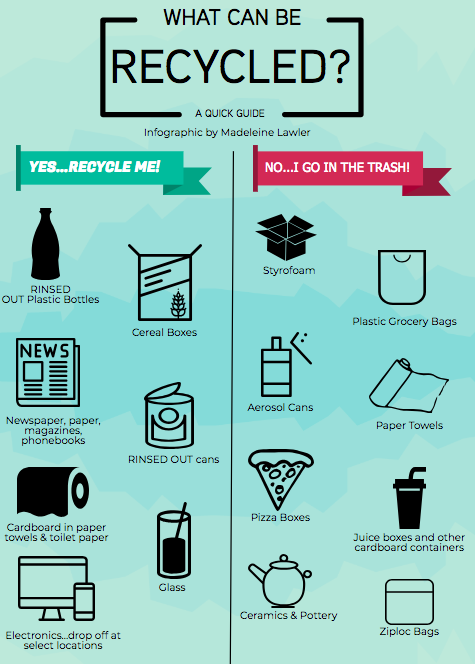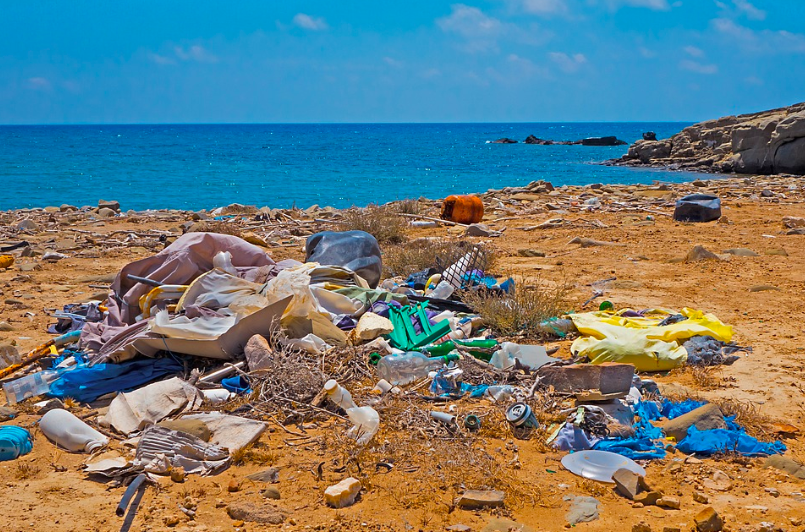Going green as a teen
Tips, tricks, and ideas on how you can help save the environment
April 22, 2019
Photo by Photo used with permission of pixbay.com
Plastic and other trash sits on a “waste beach.” Scientists estimate that by 2050 there will be more plastic in the ocean than fish, but how can we as teens even help change this?
Coral reefs are predicted to be gone in 30 years. 2.2 billion tons of waste is already dumped into our oceans, with more being added every year. And statistics show that environmental disasters are drawing nearer: climate change, acid rain, deforestation, ozone layer depletion, and more. But how, as just a teen, are you able to make a dent on this environmental damage? The answer may be larger than you think.
Living a greener life can have a wide variety of meanings, and there’s no right answer as to how to help save our planet. It can be tempting to just throw up our hands and say we don’t have control over the planet, but this not the case. Even as a teen, there are hundreds of choices we can make, from just making small daily habit changes to starting an international campaign. Here’s a list of ways you can start saving the environment before it’s too late.
Daily habit & lifestyle changes
- Reduce your use of plastic and recycle

Infographic by Madeleine Lawler
Screenshot this reminder for a go-to guide when you need to decide where your trash goes.
Although the word “recycle” may be something you’ve heard your whole life, it’s important to educate yourself on what’s recyclable and what’s not. According to Julie Gyarmaty, AP Environmental Science teacher and REACT club sponsor, the biggest mistake students make is not rinsing out plastic bottles and containers that contain sugary or sticky drinks. In addition, candy wrappers and other plastic labels cannot be recycled. If you make a mistake when recycling, the entire load will have to be thrown away, and eventually, end up in a landfill or the ocean. Despite this possibility, however, the school does recycle and students should recycle as much as possible, according to Gyarmaty.
- Stop eating so much meat
No, you don’t have go vegan and never eat a burger again. But the production of red meats releases a lot of methane gas into the atmosphere, and also goes hand in hand with fossil fuel usage, effluent waste, and water and land consumption. Not only will reducing your meat intake help the environment, but it’s also proven to have several health benefits as well.
- Reduce Carbon footprint- drive less
Every time you choose to get in your car, you are choosing to release carbon dioxide and other pollutants into the atmosphere. Try to carpool, bike, or even walk, at least once in a while.
- Use less electricity– shorter showers, unplug, turn off lights
Not only will your electricity bill go down, but by taking shorter showers, turning off the lights, turning off the faucet, and unplugging appliances when they’re not in use, you’re ultimately decreasing the demand for nonrenewable energy such as fossil fuels.
- Start composting
Turn your trash into treasure and hop onto the composting trend. Start with a compost bin or backyard pile, and follow these directions to easily turn your cardboard, newspaper, egg shells, fruit and veggie scraps, and more into healthy, environmentally friendly soil. And contrary to popular belief, compost actually has a pleasant smell if done right!
- Skip the straw
Most plastic straws are too lightweight to end up in recycling, and end up in the ocean instead, killing marine life due to their non-biodegradable qualities. Americans alone use over 500 million plastic straws daily, according to a study done by OneLessStraw.org, and these straws take around 200 years to decompose in the ocean. Several companies have stopped manufacturing the sea-life killers, but it’s important for you to say no to straws, no matter how convenient they may be. If you really love straws, there are always other options such as biodegradable paper or reusable metal, bamboo, or glass straws.
- Use reusable cups, bags, water bottles
Living your life plastic-free is one of the most impactful ways you can save the oceans. Not only will it save you money in the long run, but by opting for a reusable item, you are eliminating the amount of plastic that goes into the marine ecosystems, and the amount of plastic being made to support consumer demand. Keep in mind that even if you “recycle” plastics such as plastic water bottles, new research is proving a significant amount of American recycling is still ending up in landfills. (In addition, the water inside plastic water bottles doesn’t have to meet safety standards like tap water does.) With so many options out there, there should be no excuse as to why teens can’t use reusable water bottles, shopping bags, cups, and more plastic replacements.
- Use natural cleaning supplies
Skip the bleach and other artificial chemicals, and opt for natural cleaners such as vinegar and other alternatives.
Start spending on environmentally friendly companies
- Clothing/Accessory companies
Major brands and corporations aren’t always the most eco-friendly when it comes to the production, distribution, and materials used in their products. Opt to try out eco-friendly companies instead. By supporting a “green company,” you’re not only buying products that were made sustainably and out of eco materials. Most of these companies donate proceeds of profits straight back to environmental organizations, some are even non-profits. So the next time you need a new hat, backpack, or cute shirt, try out one of these options instead.
–Nature Backs – sustainable clothing with free shipping
–Save Lands– clothing, plants 12 trees for every item sold
–Pelacase– 100% compostable zero waste phone cases
–Educated Earthling– sustainable clothing with profits going to environmental education
–Happy Earth Apparel– hats and accessories, 50% of profits go back to conservation efforts
2. Eat locally sourced food
In LZ, the farmers market is a great place to go shopping during the fall to support local farmers and sustainably grown food. If you’re looking for eco-friendly restaurants, try farm to table diners such as Consume or Beelows’s Steak House.
3. Donate!
In lieu of gifts at a party or other big event, choose an environmentally friendly organization to make donations to. Your money can go a long way as these organizations often have the resources available to make huge change on our environment. Choose an initiative that interests you, or look into one of these organizations.
Coral Gardeners– adopt a coral, they will plant a coral using new technology to try and save reefs from disappearing
Sierra Club- one of the most influential environmental organizations, they have been successful in passing major reforms such as the Clean Air and Endangered Species Act.
Trust for Public Land- aims to create parks and set aside nature reserves so that all people have access to nature close to their homes
The Ocean Conservancy– in 2015, picked up nearly 18 million pounds of trash from beaches and waters

Plastic and litter sits on a lawn in Lake Zurich. Even in local communities, students have ways to clean up the planet, as evidence of pollution is oftentimes right outside their front door, according to Gyarmaty.
Volunteer in your own community
- Join REACT club
If protecting our planet interests you, try out REACT club at school. The club often volunteers at Cuba Marsh, cutting down invasive species, or partnering with Lake Zurich Arboretum. You can participate in these activites either through the club itself, or even on your own if you wish. Contact Ms. Gyarmaty for more information on how to get involved. In addition, for Earth week (April 22nd-26th), REACT club will be hosting a different theme each day where students can get involved and receive free stickers and other prizes.
- Volunteer yourself
Grab some friends and go to a local park or forest preserve to pick up trash. When on vacation, research environmental cleanups or other volunteer options, especially if you’re going to be by an ocean or major national park.
Be politically active
- Vote for leaders who care about the environment, support global initiaves to slow climate change, and have policy ideas to curb pollution.
Unfortunately as teenagers we can’t control what decisions the giant corporations are making regarding our planet, but we can elect leaders who believe that saving Earth is a top priority, and who won’t let the corporations influence their decisions. Currently, the US is the only country in the world not part of the Paris Climate Agreement after Trump withdrew the US (although we cannot officially leave until November 2020). In addition, national controversies such as fracking, National Park funding, and renewable energy initiatives all have important consequences on the environment. It’s up to you as a newly emerging voter to decide who you will side with and which politicians you will support.
- Pave your own way
Start a campaign. Begin a Go Fund Me. Attend a climate strike. Spread the word. By choosing to promote environmental awareness and educate your community on our planet, you can make (eco friendly) waves in not only your life, but others’ lives as well. Plus, taking a stand is always something that will look good on college applications and resumes.
Why it will all matter
All in all, choosing to live a greener life is a habit that teens should implement now, Gyarmaty says.
“Students are going off to college or careers, they’re going off to start their own lives and [these] are habits that should take with them. When it comes to the environment, I think it’s so important for students to learn because they might have kids of their own, and they want to provide a good life for those kids,” Gyarmaty said. “These resources are finite, and we have to learn to conserve them so that future generations have access to the same things that we have access to. You want to leave a clean planet in order for people to be healthy, to be able to have good healthy food to eat, to enjoy the outdoors, so do the best thing that [you] can to sustain our planet.”
